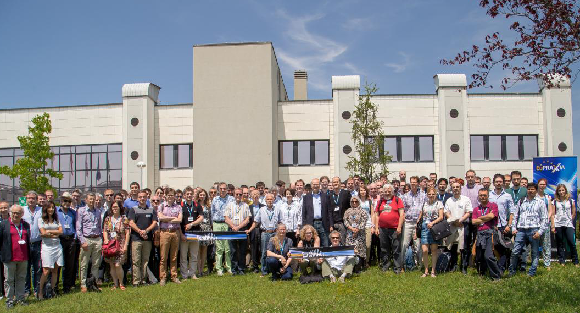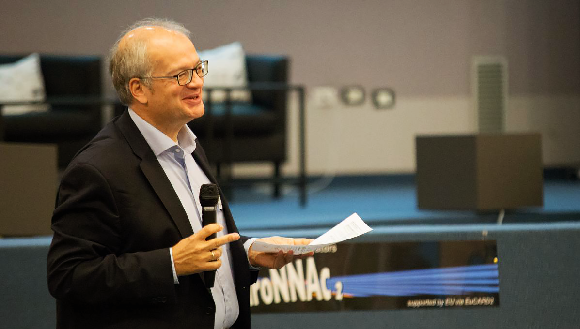
EuPRAXIA and EuroNNAc members gather for the meeting in Pisa, Italy (Image courtesy of EuPRAXIA)
Particle accelerator experts from around the world joined experts from the laser and novel accelerator communities to discuss the design of an innovative European plasma accelerator within the framework of the EuPRAXIA and EuroNNAc projects.
The workshop took place between June 29th and July 1st at the Area della Ricerca in Pisa, Italy and was hosted by the Istituto Nazionale di Ottica – CNR.
The local organiser, Leo Gizzi said: “It has been an absolute pleasure to see the vibrant discussions amongst participants. The definition of the key parameters of such an international facility with global reach and impact is one of the most exciting things a researcher can be part of. The event gave us the opportunity to reflect on the state-of-the-art and at the same time outline the R&D programme required to reach our goals by the end of the design study.”
The design and science cases of advanced plasma accelerators are subject of intense studies around the world. Progress in proof-of-principle experiments has led to the expectation that ground-breaking applications of plasma accelerators will become available in the next few years.

Ralph Assmann gives a speech to attendees at Pisa meeting (Image courtesy of EuPRAXIA)
More than 120 delegates discussed the parameters and technical specifications required at the interfaces between lasers and plasmas, plasmas and particle beams, as well as particle beams and other applications such as Free Electron Lasers, High Energy Physics detectors and ultra-compact X ray devices. Discussions also covered the specific requirements in beam diagnostics, laser technology and underpinning simulation codes.
The aim of the meeting was to collect the input from all interested parties in order to define a full parameter set that will be used as the core of a conceptual design for a European plasma accelerator with industry beam quality that shall now be developed by the project partners until the end of 2019. Targeted workshops will now be organised by each of the EuPRAXIA work packages in order to build up on the Pisa discussions and further refine all parameters.
All presentations and further information can be found on the workshop’s indico page. For more information about EuPRAXIA, please refer to the project website.
